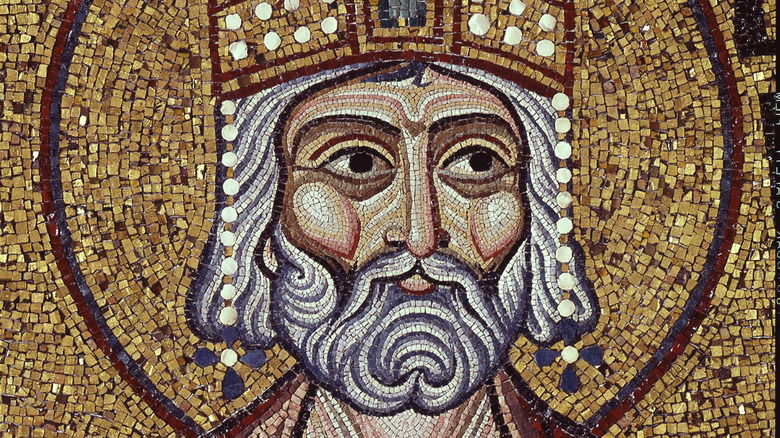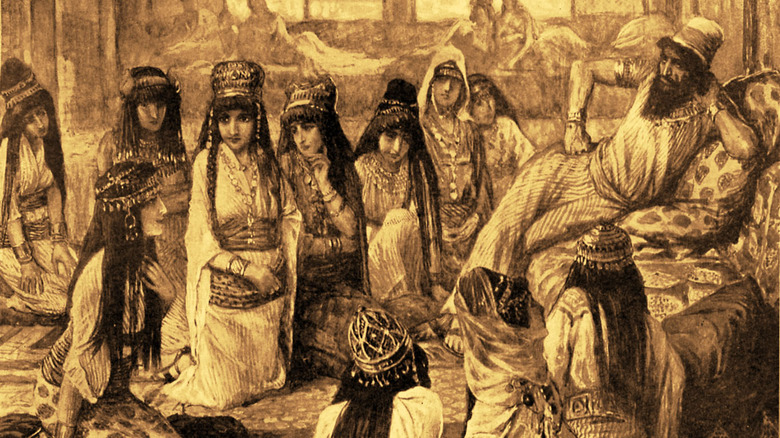How Many Wives Did King David Have?
One of the most important figures in all of the Hebrew Bible, after Moses and Abraham, was David, who ruled as king of Israel for 40 years around 1,000 B.C., according to the World History Encyclopedia. So profound was the influence of David — described in 1 Samuel 13 as a "man after God's own heart" — on the history of Israel that the modern-day state of Israel recognizes him on its flag with the Star of David, the symbol of the ancient king.
Like a lot of men of his day, David had multiple wives, as chronicled in a number of writings found in Jewish biblical texts. He also had relationships with women outside of his marriages — and at least one of those relationships caused, shall we say, complications. However, compared to his son, Solomon, who had hundreds of wives and hundreds more courtesans, David appears to have kept things relatively low-key.
King David had eight (or more) wives
Thanks to Jewish biblical writings found in the Book of Samuel and the Book of Chronicles, we know King David had at least eight wives (via MyJewishLearning). There's even a running list: For example, 2 Samuel 3 catalogs the names of his sons and the six women who bore them. (This list, however, also leaves out two other wives who bore him sons.) According to an article published by Crosswalk, when the clues from all of the biblical texts featuring David are compared, we're left with the names of eight women in total who bore him sons: Michal, Abigail, Ahinoam, Maacah, Haggith, Abital, Eglah, and Bathsheba (we'll talk more about her later).
Owing to the patriarchal culture of David's time, the names of wives who bore David daughters (and daughters only) — or no children at all — don't appear to have been recorded. So yes, he may have had more than eight wives, but history has forgotten their names. Further still, he may have had other wives who bore him sons, and their names escaped the written record. There's also the matter of courtesans at King David's court — rather, women David had relationships with outside of marriage — who may have borne him sons, but whose names were not recorded.
Where did all of King David's wives come from?
David didn't marry all of his wives all at once — rather, he entered into his marriages over the course of several years, if not decades. His first wife, Michal, was the daughter of David's friend-turned-adversary, King Saul.
According to the Jewish Women's Archive, Michal fell in love with David, much to the anger of her father. However, she was eventually allowed to marry David after he achieved a significant military victory, per 1 Samuel 18. David's second wife, Abigail, was the wife of Nabal, a man who disrespected David (it's a long story, but chronicled in 1 Samuel 25). David later married Abigail after Nabal's death. Next came Ahinoam, whom David married when he was on the run from Saul. After that, David's third marriage was to Maacah, who gave David a daughter named Tamar. (Tamar's relationships with her brothers and half-brothers would cause complications in the family.) Haggith also married David while he was in exile, as did Abital and Eglah.
But it was the last of David's wives, Bathsheba, who has become a focus of concentration in the biblical narrative of King David. Not only that, but for thousands of years, many would point to their meeting as the beginning of David's downfall (more on that later).
Who were the other women King David had relationships with?
Thanks to a number of biblical texts, we know that King David had relationships outside of his multiple marriages with at least 10 women. In 2 Samuel 20, David is described as having to deal with a number of these women during a revolt — which brings us to the matter of concubinage.
For those not familiar, a concubine is a somewhat old-school (and for many, outdated) term for a woman who is in a sexual relationship with a man to whom she is not married. The term specifically connotes that the woman in question cannot marry her relationship partner due to differences in social status or other matters, but the relationship is not considered adulterous, according to the website Difference Between. As Encyclopedia Britannica also notes, a concubine did not have the same legal rights as a wife, and any children born to a concubine do not have the same legal rights as a child conceived by married partners.
Though the idea of concubinage isn't prevalent or much in practice today, it was commonplace during David's era and treated neutrally by biblical architects. It bears noting that David may have had more than 10 concubines; it's just that biblical texts about David only mention that number, per Crosswalk.
King David's pursuit of Bathsheba changed everything
A significant portion of the biblical narrative of King David concerns his involvement with his last wife, Bathsheba. As the story chronicled in 2 Samuel 11 tells it, David saw Bathsheba bathing and was immediately smitten. Soon enough, the two engaged in a sexual relationship, though some theologians have argued that, in fact, the event was an act of sexual abuse on the part of King David (via Baylor University).
Regardless, there were multiple problems with this arrangement — not the least of which was that Bathsheba was already married to another man, Uriah. No problem, said David, who sent Bathsheba's husband to the front lines of war, all so he could be killed, with David free to marry her. And that's exactly what happened (via Jewish Women's Archive).
It was a foolproof plan, right up until when it wasn't. As described in the Book of Samuel, the narrative goes on to report the prophet Nathan confronting David about his sin, comparing the king to a common thief, and the child born to David and Bathsheba later dies. Despite this loss, Bathsheba went on to give birth to a second son, who would one day become another lauded biblical king, Solomon.
David's son, Solomon, took things to the next level
According to the World History Encyclopedia, King David died of natural causes at an advanced age, and his son, Solomon, assumed his throne. Though David had (probably) eight wives and (probably) 10 concubines, King Solomon seemed to take things up a notch in a Biblical case of "hold my beer." According to 1 Kings 11, Solomon was recorded to have at least 700 wives (though the text itself only mentions those wives "of royal birth"), and at least 300 concubines.
Though polygamy of this kind was described in the Jewish bible in neutral terms, it seems that the line was drawn at marrying the wrong wife, and men who did so paid for it dearly. Solomon's mother, Bathsheba, was an example. According to the narrative, with Bathsheba having been already married when David had sex with (or sexually assaulted) her, David and Bathsheba both paid for this by losing their first son. In-kind, Solomon's marriage to a woman also deemed "wrong" within the text cost him dearly.
Per MyJewishLearning, Solomon's mistake — one which his father managed to avoid — was marrying a woman who worshipped deities other than that of the ancient Israelites; and, taking things a step further, setting up temples so they could worship. God punished Solomon, following the king's death, by stripping away the power of his family's line. This sets the stage for a revolt that would, in the end, see his kingdom split into two.





